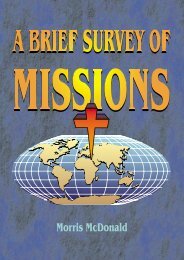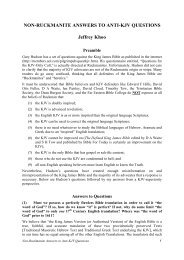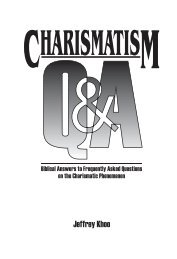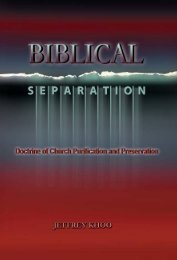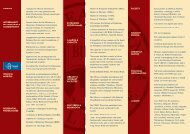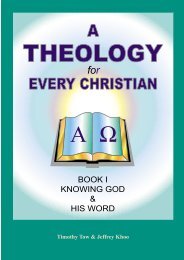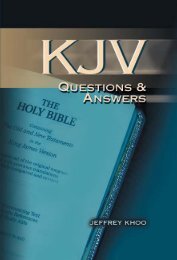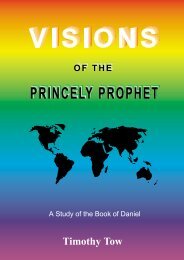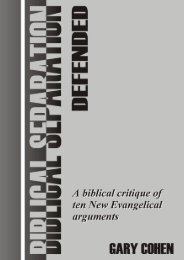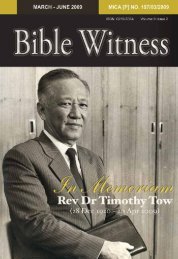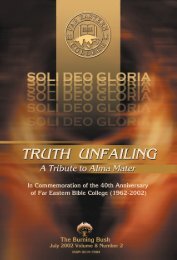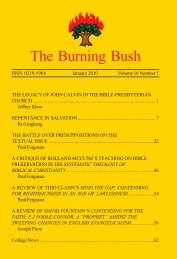50 Years Building His Kingdom - Far Eastern Bible College
50 Years Building His Kingdom - Far Eastern Bible College
50 Years Building His Kingdom - Far Eastern Bible College
Create successful ePaper yourself
Turn your PDF publications into a flip-book with our unique Google optimized e-Paper software.
Life<br />
<strong>Bible</strong>-Presbyterian<br />
Church<br />
Page 68<br />
5. We do believe “the <strong>Bible</strong> is none other than the voice of Him that sitteth upon the<br />
throne. Every book of it, every chapter of it, every verse of it, every syllable of it, every<br />
letter of it, is direct utterance of the Most High. The <strong>Bible</strong> is none other than the Word<br />
of God, not some part of it more, some part of it less, but all alike the utterance of Him<br />
that sitteth upon the throne, faultless, unerring, supreme.”<br />
a. We must declare the KJV <strong>Bible</strong> to be nothing less than God’s powerful inspired<br />
Word, just as any faithful translation of God’s Word into any language can also be<br />
presented as being <strong>His</strong> inspired word. In 2 Timothy 3:15-17, Paul refers to the<br />
Scriptures that Timothy had and calls them inspired despite the fact that he had<br />
only a copy. It is possible that he had the Old Testament in Hebrew, but it is more<br />
likely that he had the Greek translation of the Old Testament, since his father was<br />
a Greek and he lived in Lystra, which was definitely Greek-speaking. We can<br />
therefore confidently say, when we hold the KJV in our hands, that what we are<br />
holding is God’s inspired word.<br />
b. We need to be firmly convinced that it is important to keep on promoting and<br />
using the KJV. As more and more English-speaking churches around us abandon<br />
the KJV for one or more of these newer versions, it is important to understand the<br />
reasons why <strong>Bible</strong>-Presbyterians should continue to hold on to it. We live in the<br />
end times and we cannot afford to be blind to the forces that are working around<br />
us in the Christian world. Our theological position is recognised by the version<br />
we use. For example, if a person promotes and uses the Douay version or Jerusalem<br />
<strong>Bible</strong>, he is probably a Roman Catholic. If a person promotes and uses the<br />
RSV or NRSV, he is probably Liberal. If a person promotes and uses The TEV,<br />
NIV or Living <strong>Bible</strong> he is probably a New Evangelical. In fact the NIV can with<br />
full justification be called the “New Evangelical Version” (NEV) because of the<br />
deep involvement of the National Association of Evangelicals in its production<br />
and promotion.<br />
6. “We do dismiss the theories of Liberal and Modernist scholars who claim that the<br />
books of the <strong>Bible</strong> were edited compilations of stories, legends and ancient writings of<br />
many unknown human authors that were gradually adapted, edited, modified and<br />
compiled over hundreds of years until they reached their present form.”<br />
a. One example of this is their theory regarding the writing of the first five books of<br />
the <strong>Bible</strong> (Genesis to Deuteronomy). While we believe that these books were<br />
factual, historical, inspired by God and written by Moses in the 15th century BC,<br />
Liberal scholars speculate that the events described in them did not take place, but<br />
were merely made up to explain the origins and reasons behind existing phenomena,<br />
and that they evolved as documents (named J, E, D & P) written between the<br />
9th and 4th centuries by unknown writers and were gradually compiled into one.<br />
The same approach has been used on the four Gospels and other books of the<br />
<strong>Bible</strong>. The result of these theories is that the <strong>Bible</strong> is no longer regarded as being<br />
the Word of God, but as the words of men.<br />
7. “We do believe that the only correct way to interpret Scripture is by comparing verses<br />
with each other and harmonising their meaning. No part of the <strong>Bible</strong> ever contradicts<br />
another, and the verses that are difficult can be understood with the help of related<br />
verses that are easier to understand.”<br />
a. According to The Westminster Confession of Faith, chapter I, para. IX, “The infallible<br />
rule of interpretation of Scripture is the Scripture itself: and therefore,<br />
when there is a question about the true and full sense of any Scripture (which is<br />
not manifold, but one), it must be searched and known by other places that speak<br />
more clearly.”<br />
b. This results naturally from the fact that all 66 books of the <strong>Bible</strong> were written by<br />
one author, God Himself, and would therefore be completely consistent.



